All images are copyright of their respective owners and are used here under Fair Use for research and informational purposes and represent the subject of this article in critical commentary.
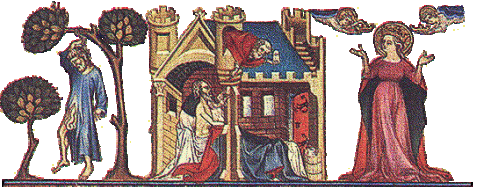
A vast source of Medieval reading material online has to begin with The Gode Cookery. Gode’s is a great, simple source for stories, recipes, art, lifestyle, illustrations, botany and science. Now, if you are interested in a little light reading, might I suggest….Tales of the Middle Ages

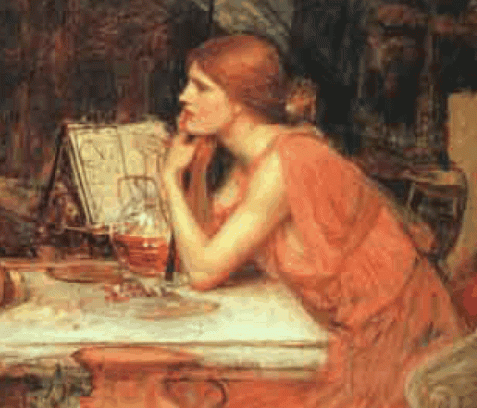
Another interesting compilation is the Secret Teachings of All Ages by Manly P. Hall, and recompiled by John Bruno Hare in 2004. This is a PDF file about 3.5 megs in size and gives the reader many inspirational avenues of research.


Chaucer does not tell us everything of the characters in his Canterbury Tales. What would their lives and pilgrimage have been like? Gode’s Cookery presents…Pilgrims Passing To and Fro


What if you were thrown back in time to the Medieval Era? How would you survive? Chances are you might be accused of being a foreigner, a spy, possessed or even…….a witch! The following blog poses the question and the comments do offer some reasonable suggestions. What if…..Survival Tips in the Middle Ages


The Malleus Maleficarum This single piece of literature is responsible for the capture, torture and execution of perhaps hundreds of thousands of individuals. It was a guidebook on the identification, hunting and trial of witches.


The Merlin Mystery Sage, poet, sorcerer, adviser, magician, or witch? It is difficult to describe a legend such as Merlin, Earl of Powyss, Taliesin. Did such a remarkable human being exist? The answer lies within oneself. Therefore consider ancient words… Llyfr Taliesin: The Book of Taliesin


Miscellaneous Writings on Primitivism An anthology of essays and tales on all things primitive and how far we’ve come. And perhaps, a little of what we have lost.


The Thirteen Worlds
by Helen S. Fayle “Once, long ago, or so the story goes, in the Deep Time, there was a great dragon, oldest of the old. In the days when the dragons roamed the universe, all of space and time was their plaything, and they revelled in it. They would create and destroy empires in a day, build vast, complicated civilisations for amusement. And once, it is said, they even created a history for themselves where they were the created, not the creators.”


Medieval Queens is a bundle of online lists by http://www.middle-ages.org.uk which can offer a starting point into researching some famous names of this bygone era.

Aradia: The Gospel of Witches
This classic of neo-Paganism is one of the few books which purports to be an actual sacred text of traditional witchcraft, in particular that of the Tuscan region of Italy. Charles Leland was an American expatriate journalist, folklorist, and author. He based this book on material which he received from a woman named Maddelena, who had assisted him in collecting regional Italian folklore. On New Years day, 1897 she handed over to him a document in her own handwriting, the Vangel, which is the core of this book. Maddelena then reportedly went missing, and never contacted Leland again. Consider the Italian myth in this translated page… Mater Terra: Stregoneria e natura

A Glimpse of Fifteen Historical Coincidences. From The Structure and Dynamics of the Psyche: “A young woman I was treating had, at a critical moment, a dream in which she was given a golden scarab. While she was telling me this dream I sat with my back to the closed window. Suddenly I heard a noise behind me, like a gentle tapping. I turned round and saw a flying insect knocking against the windowpane from outside. I opened the window and caught the creature in the air as it flew in. It was the nearest analogy to the golden scarab that one finds in our latitudes, a scarabaeid beetle, the common rose-chafer (Cetonia aurata) which contrary to its usual habits had evidently felt an urge to get into a dark room at this particular moment. I must admit that nothing like it ever happened to me before or since, and that the dream of the patient has remained unique in my experience.” – Carl Jung
The above link lists 15 “amazing” documented coincidences. The comments attached give perspective on individual experiences and are a read in themselves. Image: touregypt.net

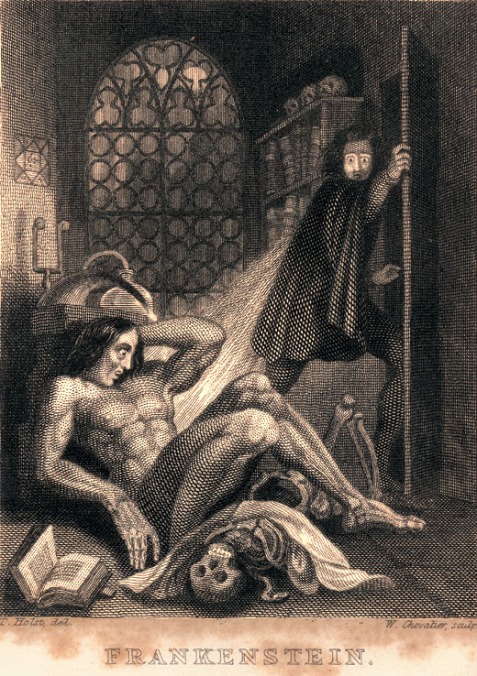
The origins of Gothic Literature. “Gothic fiction (sometimes referred to as Gothic horror) is a genre of literature that combines elements of both horror and romance. As a genre, it is generally believed to have been invented by the English author Horace Walpole, with his 1764 novel The Castle of Otranto.” ~ Wikipedia.
This first edition purported to be a translation based on a manuscript printed at Naples in 1529 and recently rediscovered in the library of “an ancient Catholic family in the north of England.” The Italian manuscript’s story, it was claimed, derived from a story still older, dating back perhaps as far as the Crusades. This Italian manuscript, along with alleged author “Onuphrio Muralto,” were Walpole’s fictional creations, and “William Marshal” his pseudonym.
A few pioneers of Gothic literature: Horace Walpole; Charles Maturin; Ann Radcliffe; Bram Stoker; Daphne du Maurier; Mary Shelley.


Howard Pyle illustration from 'The Wonder Clock'
The Age of Fable by Thomas Bulfinch.
“Without a knowledge of mythology much of the elegant literature of our own language cannot be understood and appreciated.” Written to “teach mythology not as a study but as a relaxation from study,” these ageless volumes span the ages: from the Olympus of Zeus and the Valhalla of Thor, to the Round Table of King Arthur and the escapades of Robin Hood…

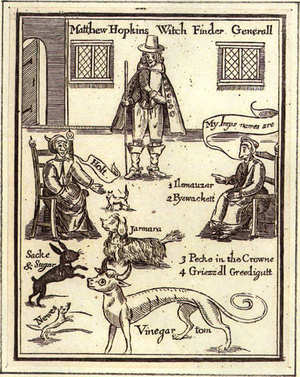
Matthew Hopkins, Witch Finder General. sawneybean.com briefly details some of the saga of Mr. Hopkins, a self-appointed disposer of witches. Vigilantes such as this notorious individual are said to be responsible for millions of deaths. Did he finally face justice? Consider Samuel Butler‘s satire Hudibras commented on Hopkins’s activity, saying:
- Has not this present Parliament
- A Lieger to the Devil sent,
- Fully impowr’d to treat about
- Finding revolted witches out
- And has not he, within a year,
- Hang’d threescore of ’em in one shire?
- Some only for not being drowned,
- And some for sitting above ground,
- Whole days and nights, upon their breeches,
- And feeling pain, were hang’d for witches.
- And some for putting knavish tricks
- Upon green geese and turky-chicks?
- And pigs, that suddenly deceast
- Of griefs unnat’ral, as he guest;
- Who after prov’d himself a witch
- And made a rod for his own breech.
The last line refers to a tradition that disgruntled villagers caught Hopkins and subjected him to his own “swimming” test: he floated, and it was therefore suspected that he was hanged for witchcraft himself but, again, no evidence of this ever happening exists. However, it is believed by most historians that Hopkins actually died of illness (possibly tuberculosis) in his home. The parish records of Manningtree in Essex record his burial in August of 1647. ~wikipedia


The Decline of Witch Trials in Europe by James Hannam.
“Until recently popular views of this subject were confused both by the agendas of rationalists who wanted to find examples of superstition and by neo-pagans seeking their own foundation myth. The “Burning Times”, when, according to the most extreme polemicists, nine million women lost their lives after dreadful torture, has become an essential part of neo-paganism’s self identity.”

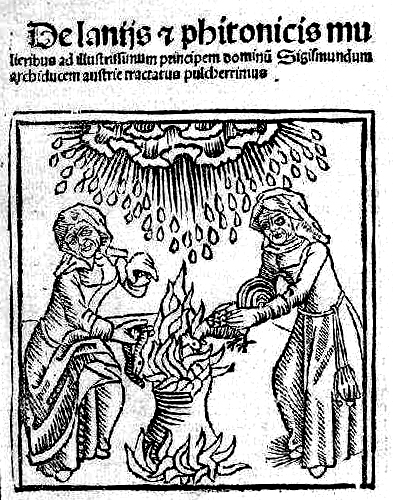 Witchcraft and Magic in Europe
Witchcraft and Magic in Europe
By Karen Louise Jolly, Edward Peters, Catharina Raudvere, Bengt Ankarloo, Stuart Clark. Read a few passages from their essays on google books. The link connects with reference to Ulrich Molitor, and his De lamiis et phitonicis mulieribus. For more texts and images on medieval witches, see the University of Glasgow collections.

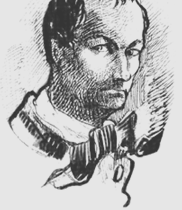
Charles Baudelaire, self portrait (1821 - 1867)
The Poetry of Charles Baudelaire. Baudelaire a sharp social critic and poet published Fleurs de Mal (Flowers of Evil) in 1857. This is significant because he defined ‘ennui’ or annoying boredom, in his Au Lecteur or Forward to Readers which has been used to explain the origin of sin. An example poem:
Sed non Satiata (Never Satisfied)
Strange goddess, brown as evening to the sight,
Whose scent is half of musk, half of havanah,
Work of some obi, Faust of the Savanah,
Ebony witch, and daughter of the night.By far preferred to troth, or drugs, or sleep,
Love vaunts the red elixir of your mouth.
My caravan of longings seeks in drouth
Your eyes, the wells at which my cares drink deep.Through those black eyes, by which your soul respires,
Pitiless demon! pour less scorching fires.
I am no Styx nine times with flame to wed.Nor can I turn myself to Proserpine
To break your spell, Megera libertine!
Within the dark inferno of your bed.
— Roy Campbell, Poems of Baudelaire (New York: Pantheon Books, 1952)

A modern, Gothic flavor that touches on basic, intimate fears.
Thumbs tripping. Wringing hands dripping to your voice,
“I’ve lived a death in wait for you.”
“Later, I’ve got things to do.”
“I’ll lick your ears with never agains.”
“Whenever, I guess, I rarely can.”
“Don’t bother. They’re plans you’ll just forget.”
“hello? When were you ever there yet?”And the ringing left, reeling at disconnect, clawing through frayed spaces.
Falling turnstile through pedestrian backdrops of stickmen days burning in faces.
Don’t realize me, don’t flee. I’ll walk away softly, a slink, clinging rotten, mistaken washed over forgotten for another you.
Sung out of season and reasoned unforeseeable, best sutured, tongue pinned future inward.
And the rungs taunt higher. And the ringing sings crying, “remember me, tenderly, remember when we swayed in “goodbyes”, dreams dripping from our ears.




davey2010 said,
June 25, 2010 at 2:29 pm
Hello dudes :), this is a great forum! Also is it acceptable to donate to the owner of this website? good stuff!
admin said,
June 27, 2010 at 5:56 pm
Our children would rather our wits, than our gold, but perhaps there’s a charitable organization we may help together. Fare thee well.
Jeanne said,
July 19, 2010 at 4:57 pm
What a delicious site. Thank you for the careful design, the marvelous art, the well-written summations, and the richness of sources. I am delighted to have drifted into this world today.
admin said,
July 19, 2010 at 8:21 pm
Thank you for visiting, Jeanne. It’s wonderful to meet travelers such as yourself. This online glade is for you. Feel free to discuss anything you wish.